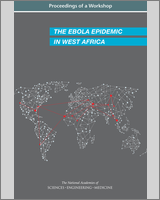NCBI Bookshelf. A service of the National Library of Medicine, National Institutes of Health.
National Academies of Sciences, Engineering, and Medicine; Health and Medicine Division; Board on Global Health; Forum on Microbial Threats. The Ebola Epidemic in West Africa: Proceedings of a Workshop. Washington (DC): National Academies Press (US); 2016 Nov 30.

The Ebola Epidemic in West Africa: Proceedings of a Workshop.
Show detailsDAY ONE: TUESDAY, MARCH 24, 2015
| 8:00–8:30: | Registration and coffee |
| 8:30–8:45: | Welcoming remarks: Victor Dzau, President, Institute of Medicine (now the National Academy of Medicine) |
| 8:45–9:15: | Workshop overview: David A. Relman, James M. Hughes, Lonnie King |
| 9:15–9:30: | Welcoming remarks: Isabella Danel, Deputy Director, Pan American Health Organization |
| SESSION I: | The Ebola Epidemic in West Africa—What Makes This Outbreak Different from Past Outbreaks? |
| Moderator: James M. Hughes | |
| 9:30–10:00: | The emergence of Ebola hemorrhagic fever: From Central Africa to West Africa |
| David Heymann, Public Health England | |
| 10:00–10:30: | 39 years of Ebola outbreak experiences in the Democratic Republic of Congo (DRC): An African perspective |
| Jean Jacques Muyembe, Democratic Republic of the Congo | |
| 10:30–10:45: | BREAK |
| 10:45–11:15: | The Ebola epidemic: Changing clinical and epidemiological perspectives |
| Daniel Bausch, Tulane University | |
| 11:15–11:45: | Ebola in West Africa: An analysis of the current situation |
| Keiji Fukuda, World Health Organization | |
| 11:45–12:15: | DISCUSSION |
| 12:15–1:00: | LUNCH BREAK |
| SESSION II: | The Science of Ebola |
| Moderator: Kevin Anderson | |
| 1:00–1:30: | Bats as reservoir hosts for filoviruses |
| Jonathan Towner, U.S. Centers for Disease Control and Prevention | |
| 1:30–2:00: | Cross-border transmission dynamics of the Ebola filovirus in West Africa |
| Stephen Gire, Broad Institute | |
| 2:00–2:30: | The response to the Ebola outbreak: A view from the NIH |
| Michael Kurilla, National Institute of Allergy and Infectious Diseases | |
| 2:30–3:00: | DISCUSSION |
| 3:00–3:30: | BREAK |
| 3:30–4:00: | Laboratory diagnosis of the Ebola filovirus in low-resource settings |
| Heinz Feldmann, Rocky Mountain Laboratory/National Institutes of Health | |
| 4:00–4:30: | Ebola filovirus drug and vaccine development |
| Thomas Geisbert, University of Texas Medical Branch | |
| 4:30–5:00: | Antibodies against Ebola: A global collaboration |
| Erica Saphire, The Scripps Research Institute | |
| 5:00–5:45: | DISCUSSION |
| 5:45: | ADJOURNMENT |
DAY TWO: WEDNESDAY, MARCH 25, 2015
Domestic and International Community Response to Global Infectious Disease Outbreaks
| 8:45–9:15: | Registration and coffee |
| 9:15–9:30: | Welcome and summary of day one: David Relman |
| SESSION III: | The International Community's Response |
| Moderator: Andrew Clements | |
| 9:30–10:00: | Preparing for the future: Developing a global health risk framework |
| Victor Dzau, President, Institute of Medicine (now the National Academy of Medicine) | |
| 10:00–10:30: | The MSF response to the West African Ebola outbreak |
| Armand Sprecher, Médecins Sans Frontières (MSF) | |
| 10:30–10:45: | BREAK |
| 10:45–11:15: | Sierra Leone's response: Challenges and barriers to get to “zero” |
| Joseph Fair, Fondation Mérieux USA | |
| 11:15–11:45: | Ebola in West Africa: From disease outbreak to humanitarian crisis |
| Oyewale Tomori, Nigerian Academy of Science | |
| 11:45–12:30: | DISCUSSION |
| 12:30–1:15: | LUNCH |
| SESSION IV: | Ethical and Logistical Challenges of Treatment Implementation: What Works; What Doesn't Work; What More Needs to Be Done? |
| Moderator: Gary Roselle | |
| 1:15–1:45: | Emergency medicine: Perspectives from West Africa |
| Colin Bucks, Stanford University | |
| 1:45–2:15: | Ebola preparedness in Germany: Competence focused in specialized laboratories and treatment centers |
| Reinhard Burger, Robert Koch Institute | |
| 2:15–2:45: | Regional preparedness for responding to an Ebola-like infectious disease emergency |
| Sylvain Aldighieri, Pan American Health Organization | |
| 2:45–3:00: | BREAK |
| 3:00–3:30: | U.S. public health response to the Ebola epidemic: Role in the global response |
| Inger Damon, U.S. Centers for Disease Control and Prevention | |
| 3:30–4:00: | U.S. health care perspective and challenges |
| Bruce Ribner, Emory University | |
| 4:00–4:30: | How has our thinking evolved regarding containment care? |
| Mark Kortepeter, Uniformed Services University of the Health Sciences | |
| 4:30–5:15: | DISCUSSION |
| 5:15–5:20: | CONCLUDING REMARKS AND ADJOURNMENT |
- Workshop Agenda - The Ebola Epidemic in West AfricaWorkshop Agenda - The Ebola Epidemic in West Africa
Your browsing activity is empty.
Activity recording is turned off.
See more...